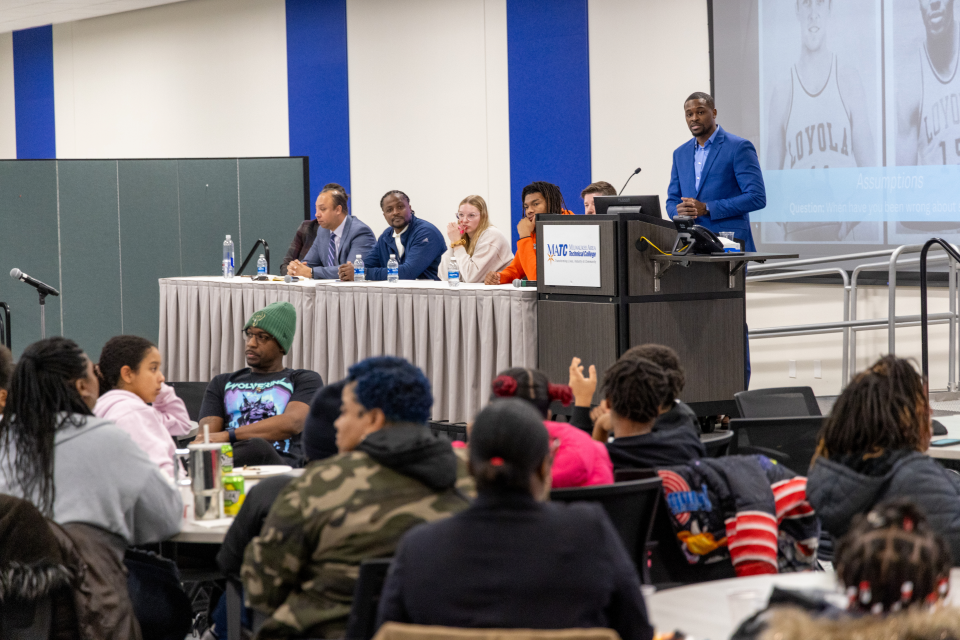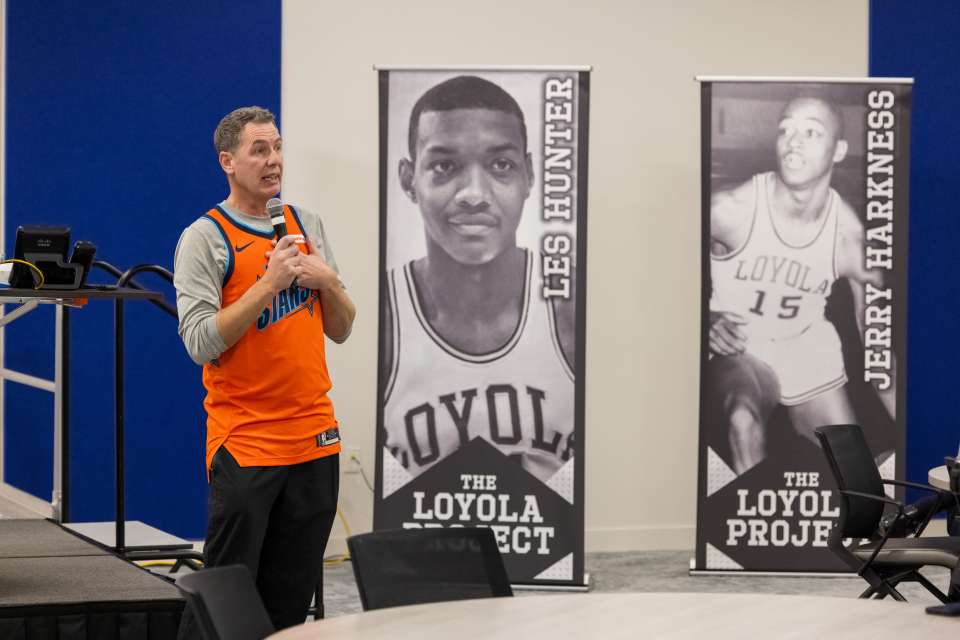
Athletics help shape student success. These Loyola players showed the courage and resilience to break down barriers on and off the court.
The Loyola University men’s basketball team delivered quite a teaching moment back in 1963, imparting lessons so powerful that they persist and resonate more than six decades later.
The Ramblers, led by four Black players, won a national championship while battling racial discrimination, breaking unwritten rules, challenging assumptions, and forging strong bonds between teammates.
The team’s struggles and successes during that championship season were chronicled in a documentary film called “The Loyola Project,” which was released in 2022.
On Monday, February 17, at Milwaukee Area Technical College’s Downtown Milwaukee Campus, a panel of guests reviewed segments of the film and discussed how the 1963 Loyola team showed the continuing importance of courage, mentorship, critical thinking, a sense of belonging and allyship.
The event, part of MATC’s celebration of Black History Month, was attended by about 100 students and staff. It was sponsored by the college’s Black Excellence Leadership Alliance (BELA) employee affinity group, Student Life, the Athletics department and Northwestern Mutual, which partnered with the producers to present the film at college campuses across the country.
See more photos from the event
“We believe stories matter,” said attendee Adam Deutsch, the growth and development director at Northwestern Mutual. “This film relates a remarkable journey of personal courage by this team.”
“Athletics help shape student success,” added Randy Casey, MATC’s athletic director and head men’s basketball coach. “These Loyola players showed the courage and resilience to break down barriers on and off the court.”
Walter Cullin Jr., MATC’s coordinator of credentialing and certification, moderated the panel, which included:
- Jordan Jones, a player on the MATC men’s basketball team
- Travis Mrozek, MATC’s assistant athletic director
- Rachel Schlies, a player on the MATC women’s basketball team
- Saul Smith, a former college player and assistant coach and now a financial representative at Northwestern Mutual
- Joah Tucker, who played at the University of Wisconsin-Milwaukee from 2004 to 2006 and played professionally in Europe, for the Harlem Globetrotters and the American Basketball Association
Mentorship
In the film, Loyola player Jerry Harkness didn’t think much of his skills until baseball star Jackie Robinson sees him playing and tells him how good he is.
Being tapped like that resonated with Schlies: Her high school coach helped her connect with MATC and her father always encouraged her to keep playing. “Back then I never thought I would be playing right now,” she said.
All students, especially athletes, need to develop a support system of trusted friends, relatives, confidants and mentors who can help them once the games are over, Tucker said. “You need to find what your identity is once the ball stops bouncing,” he said.
“We need people to have confidence in themselves,” said Smith, who was coached by his father, legendary college coach Tubby Smith. “They need to find that confidence from the people around them.”
Unwritten Rules
The film discussed how in 1963 there was a tacit understanding, a “gentlemen’s agreement,” that no more than three Black players could be on the court at the same time. Loyola routinely played three or four at once. The team also played a game against Mississippi State, breaking the “unwritten law” that Mississippi teams would not play against Black players.
A little rebellion isn’t bad, the panelists said.
“It’s all right to question the status quo if you don’t agree with it or don’t understand it,” Mrozek said. “It’s all right to ask questions to find out why things are that way.”
“It’s okay to feel uncomfortable,” Schlies said. “And it’s ok to stick up for yourself and ask questions. Speak your truth.”
Sense of Belonging
In the film, several Black players said they felt excluded from parts of campus life. For example, they couldn’t get a haircut at the same shop as their white teammates.
Growing up in Wausaukee, a village of 596 people in central Wisconsin, Schlies saw only white.
She lived in a White neighborhood, attended a White school and had White friends. She hardly saw anything but white until she enrolled at MATC.
In 2024 she was the only White player on the Stormers team.
“It was different being the different person,” said Schlies, who is completing her associate degree in teacher education at MATC. “For once, I wasn’t the norm.”
Tucker attended Milwaukee Public Schools until ninth grade, when he enrolled at Nicolet High School in Glendale.
“I definitely didn’t feel included at all,” Tucker remembered about his first weeks at the school. “But when you face trials and tribulations, that’s when the growth starts.”
At the University of Kentucky, Smith said he sometimes felt isolated from the other players because his father was the coach. “It wasn’t easy,” he said. “Sometimes they would say things about the coach, and that was my dad.”
Assumptions
In the film, Loyola’s White players admitted they didn’t really know about the discrimination or struggles their Black teammates faced. They just figured they were fine.
Jones, in his second year at MATC, admitted he was totally wrong about head coach Casey. “Coach Casey likes to yell and scream, and I was having a hard time figuring out what the message was behind all that,” Jones said. “But after sitting and talking to him, I was able to figure that out.”
“Sometimes sitting down and talking does wonders,” said Mrozek, who has worked at the college for 17 years. “Biases can shatter when you have a simple conversation.”
Financial Empowerment
The panel also talked about how some of today’s athletes are getting handsomely paid by businesses to use their name, image and likeness (NIL) — something players in 1963 could never do.
John Podziemski, who works in MATC’s printing services, spoke about his son, Brandin, being selected in the first round of the 2023 NBA draft by the Golden State Warriors.
“I believed NIL was short-term money that took time away from working on your craft,” he said. “So few people make it to the league (the NBA). If you have a chance to make it, you need great people in your corner.”
“Players who can get NIL need a plan, a good financial plan,” Tucker added. “There are a lot of complicated parts and the landscape seems to be changing so fast.”
See list of Black History Month 2025 events at MATC
About MATC: As Wisconsin’s largest technical college and one of the most diverse two-year institutions in the Midwest, Milwaukee Area Technical College is a key driver of southeastern Wisconsin’s economy and has provided innovative education in the region since 1912. More than 30,000 students per year attend the college’s four campuses and community-based sites or learn online. MATC offers affordable and accessible education and training opportunities that empower and transform lives in the community. The college offers more than 180 academic programs — many that prepare students for jobs immediately upon completion and others that provide transfer options leading to bachelor’s degrees with more than 40 four-year colleges and universities. Overwhelmingly, MATC graduates build careers and businesses in southeastern Wisconsin. The college is accredited by the Higher Learning Commission.

